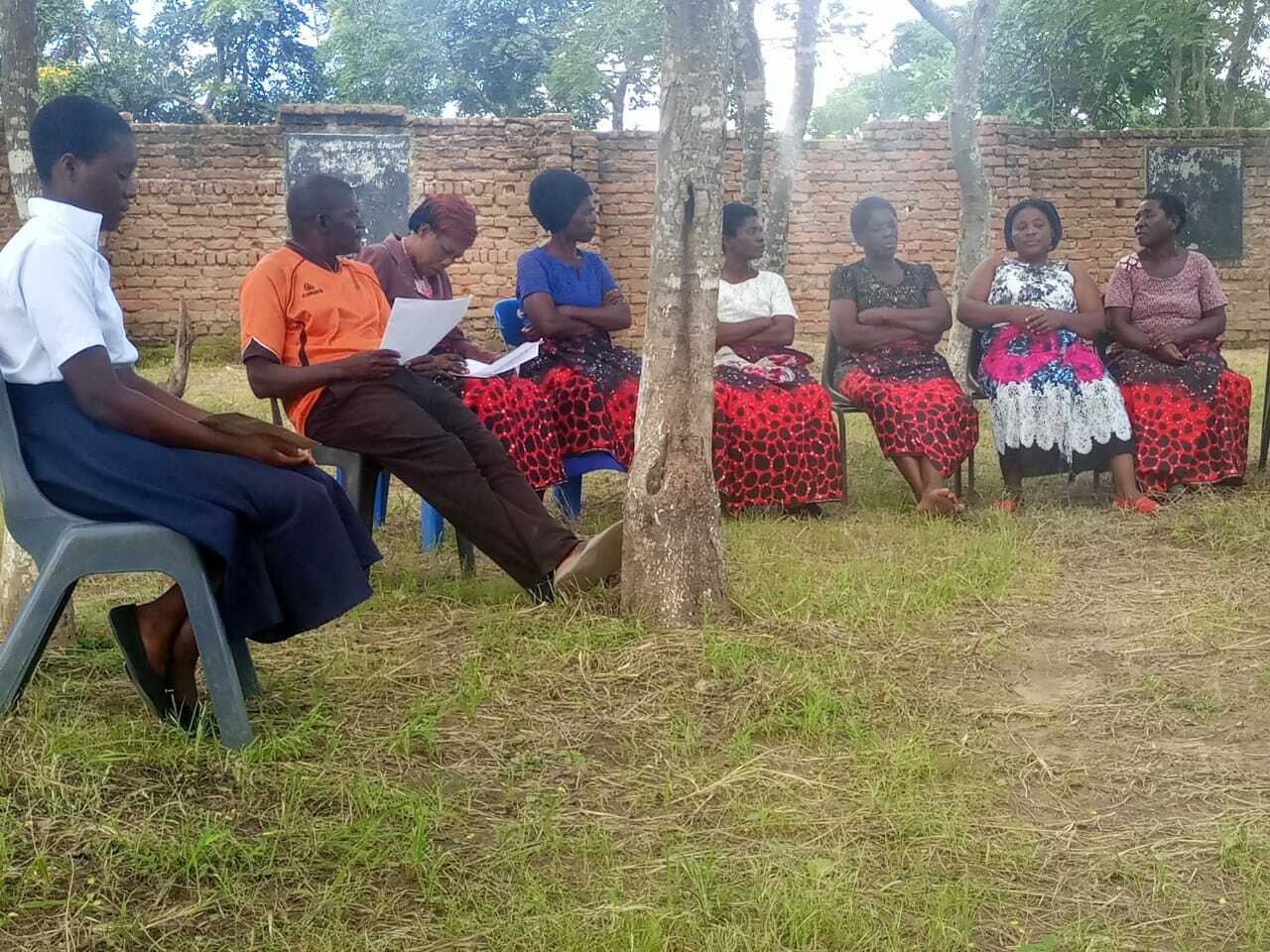Project Summary
In this practice-based inquiry I aimed to answer four specific questions related to a support program in a school: (1) what are the re-integration challenges of a sample of Form 3 girl students who temporarily withdrew due to pregnancy and were re-admitted? (2) What are the psychosocial support approaches of Mother Group provided to Form 3 girl students who were re-admitted? (3) What is the impact of psychosocial intervention offered by Mother Group to re-admitted girl students on drop-out rate? (4) How does the psychosocial support provided by Mother Group to re-admitted girl students improve their mental health, well-being and hope for their education?
The research findings indicated that feelings of shattered dreams, being given demeaning nick names by fellow students, difficulty in balancing school activities and motherhood, reduced financial support from parents, fear of being viewed as a bad influence on others, covert stigmatization by school mates, friends, and community resulting into negative attitudes towards them are among the major challenges facing adolescent mothers in school. However, Mother Group provided inspirational talks, one-on-one counseling sessions, small group discussions, and a week-long girls-retreat which helped participating adolescent mothers with staying in school after being re-admitted and remaining focused on their academic progress.
Project Context
This section describes the background to the situation of girl students who withdraw from school due to pregnancy and are later re-admitted to continue their education. Being an adolescent mother is associated with school dropout, unemployment, poverty and poor nurturing results for the birthed babies (Gyesaw and Ankomah, 2013). The National Statistical Office of Malawi (2017) reported that adolescent (age range 15-19) pregnancies in Malawi were at 29%. In addition, only 5% of females complete secondary schooling. Other research indicates that adolescents in general become highly sexually active (Dick and Ferguson, 2015; Sedgh, Finer, Bankole, Eilers and Singh, 2014) with many of the females put at risk of becoming pregnant. Pregnancy reporting in the 3 districts in Malawi in 2020 and 2021 was as follows: 396 teenage pregnancies were registered in Ntchisi district in the first half of 2021 (Chaima, 2021); in the first half of 2020, 2,336 teenage pregnancies were reported in Machinga district (Nayeja, 20 August, 2020), while Mangochi district registered 7,274 pregnancies (Matebule, August 1, 2020). Most of these girls were re-admitted to school to enable them to complete their education following the 2018 re-admission policy (Ministry of Education, Science & Technology, 2018).
This inquiry was conducted at Mpilo Community Day Secondary School (pseudonym). Mother Group at this school is an extra layer of support to the community’s School Management Committee and PTA to support girls’ schooling. The participants are drawn from the surrounding 33 villages in the area of Senior Chief Petulo (pseudonym). Most of the women in these villages are functionally illiterate, and some of these women become members of Mother Group. The group provides a range of services, including financial support for the neediest of the girls through fundraising activities such as farming and sewing. Mother Group seeks to enable girls who have dropped out to complete their secondary education and to ensure that all girls are in school and are learning. This is seen as critical to keeping them from marrying early and being subjected to sexual and gender-based violence.
Research Goal, Method, and Outcome
Background, Rationale, and Research Goal
Teenage pregnancy leads to a range of psychological problems including depression, mood swings and suicidal thoughts. Pregnant teens feel estranged from their classmates. My log of critical incidents in my teaching career so far indicates that these girls appear somewhat ‘withdrawn’ during lessons and do not fully and actively participate in lesson activities. They usually appear ‘lost’ during the length of the lesson activities.
Girls who get pregnant during secondary and primary school in Malawi are obliged to interrupt their studies to attend to their pregnancy and the resultant responsibilities of motherhood. Teenage pregnancy becomes a great disruption to girls’ schooling in Malawi, and some do not get back to school once they have given birth. Adolescent motherhood is oftentimes unplanned, and adolescent student mothers are subjected to many psychosocial challenges. In addition, for those who do go back to school, covert stigma and abuse from fellow students, teachers and support staff very often become an area of stress and worry. This further reduces the likelihood of these young women achieving academically and reaching their potentials.
From my teaching experience spanning thirteen years, I have noted that the challenges for pregnant teenagers include inability to concentrate in class and during studies, inability to organise themselves for studies, depression, anxiety, low self-esteem, self-isolation and family conflicts, which all ultimately affect their intrinsic motivation to effectively engage in academic work. Community psychosocial support for such girl students as that provided through Mother Group is an intervention strategy for addressing these problems.
This practitioner research sought to explore the psychosocial support provided to re-admitted girl students by Mother Group, a special program at Mpilo Community Day Secondary School (pseudonym) and how the support contributed to the students’ learning. Mpilo is a commuter school with most students coming from their parental homes. In the spirit of collegiality, I engaged a critical friend in developing, shaping and coming up with this inquiry. A critical friend (Costa and Kalick, 1993) is someone who is honest and open, accepts and values the views others and who is willing to try to see things from the other person’s perspective. I then commenced the inquiry by exploring the challenges these students face in school and in their residence.
In this inquiry, I aim to answer four specific questions: 1) what are the re-integration challenges of particular Form 3 girl students (Brenda, Gertrude, Tamala and Sonia) (all pseudonyms) who temporarily withdrew from their studies due to pregnancy and were later re-admitted? 2) What psychosocial support approaches by Mother Group are provided to Form 3 girl students who temporarily withdrew due to pregnancy and are later re-admitted? 3) What is the impact of the psychosocial intervention offered by Mother Group to re-admitted girl students on the drop-out rate? 4) How does the psychosocial support by Mother Group improve the mental health, well-being and hope for their education futures of re-admitted girl students?
While conducting this research, I was fully cognizant that being a staff member of my institution left me open to pre-conceived notions and conceptions and potential bias but I also thought it would allow me to be more in tune with the participants. My privileged knowledge and experience of the school and education system in Malawi allowed for my deeper understanding of the context in which expected results of my inquiry would be situated and perhaps would provide a wider picture than what might be presumed.
Method
Practitioner research is considered a strategy by which to investigate educational practice in order to reconsider or transform education (Ellis, 2012). Cochran-Smith and Lytle (2009) have asserted that school-based research by teachers should be an integral part of school culture. Mercer (2007) argues that “…the insider researcher knows the moral mazes and subtexts of the institution… and so what taboos to avoid, what shibboleths to mumble and bureaucrats to placate….” (p. 6). Herranen et al. (2019) further argues that teachers who engage in research understand better their own daily practices as well as many ways of improving them. Mercer (2007) notes that “…insiders will undoubtedly have a better initial understanding of the social setting because they know the context; they understand the subtle and diffuse links between situations and events…” (p. 6). In a cautionary note, Brannick and Coghlan (2007) highlight that insider researchers “….might struggle with role conflict if they find themselves caught between ‘loyalty tugs’ and ‘behavioural claims….” (p. 36).
This inquiry utilized qualitative research and included focus group discussions, in-depth individual interviews and participant observation in the form of notes on responses and anecdotes recorded in my personal reflective journal. This approach fit with my position in the school as the deputy headmaster. Rennekamp and Nall (n.d.) observe that “the intent of the focus group is to promote self-disclosure among participants” (p. 1). Dilshad and Ijaz Latif (2013) note that focus group discussions are used to navigate differences in perceptions, understandings, attitudes, opinions and behaviours in relation to relevant issues. Krueger (2014) further notes that “the group must be small enough for everyone to have opportunity to share insights and yet large enough to provide diversity of perceptions” (p. 6). Adolescent student mothers share many of the same ordeals and experiences yet hold diverse views, making focus group discussions a good fit for generating data regarding the experiences of student mothers.
I was interested in individual student’s own lived experiences of the challenges they have faced as student-mothers and their views of the psychosocial support they received from members of Mother Group. I conducted focus group discussions and in-depth one-to-one interviews with a small number of re-admitted adolescent girl students aged between 16–18 years, purposefully selected from the Form 3 Class. I also conducted focus group discussions with members of Mother Group (6), members of the school’s PTA (4) and the Headmaster of the school. The research was conducted between 4th January, 2022 and 11th January, 2022.
Demographic Characteristics of Participants
This research focused on four adolescent mothers of the age group 16 to 18 years as shown in the table below.
Table 1
Adolescent Mothers’ Background Characteristics
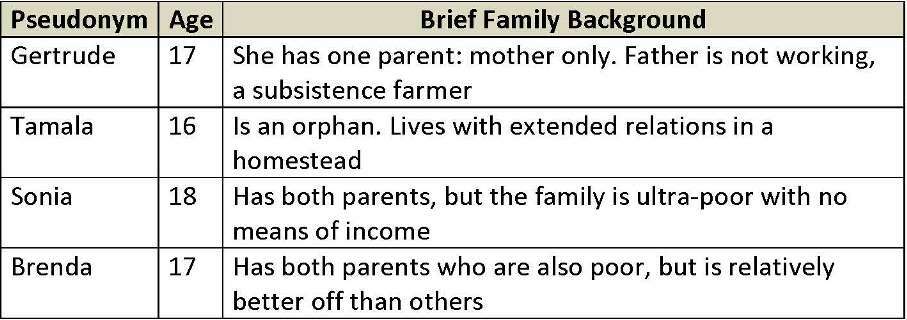
Data Collection and Analysis
The data were generated from the focus-group discussions, in-depth interviews and my personal reflective journal based on each specific research question. Table 2 shows the research purposes and various methods used to gather data for different samples.
Research questions, analytical methods, and results are in the Findings and Discussion. In general, data from focus group discussion, in-depth interviews, and key informant interviews were analysed to elicit themes across participants. Then, I recorded the final key information and quotes for each research question within the context of the main research question.
Table 2
Summary of Methods
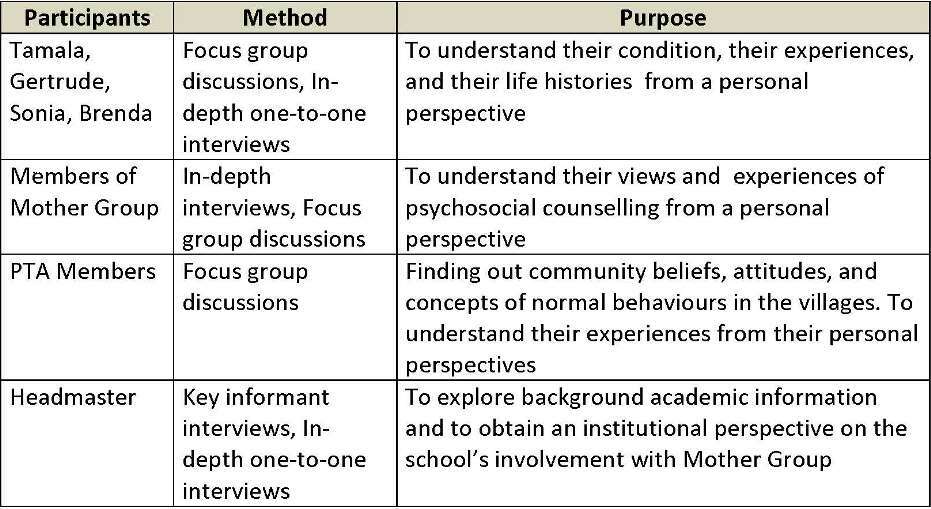
Findings and Discussion
The main inquiry question and specific inquiry questions
The focus of this inquiry was the impact of psychosocial support given to re-admitted girl students at a Secondary School in Malawi with the main inquiry question being: How does Mother Group psychosocial support to re-admitted girl students affect their learning? To address this research question, specific questions were formulated to explore the experiences of a select number of girl students.
Specific Inquiry Question 1 and the Emerging Themes
The specific inquiry question responded to was: What are the challenges faced by Form 3 girl students (Brenda, Gertrude, Tamala and Sonia) (pseudonyms) who temporarily withdrew due to pregnancy and were subsequently re-admitted to school? In response to this research question the student-respondents stated the challenges as shown in Table 3 below.
Table 3
Challenges Faced By Form 3 Adolescent Mother Students
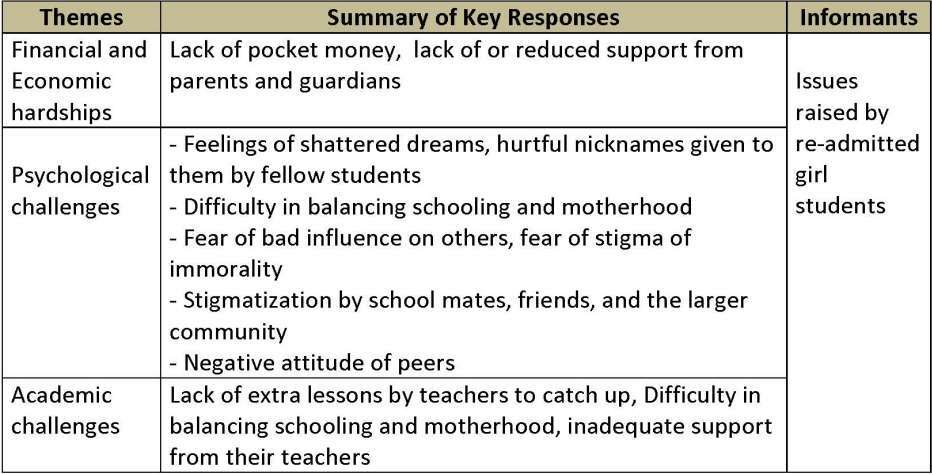
The responses of other informants included in the study are summarized in Table 4 below.
Table 4
Challenges Faced By Form 3 Adolescent Mother Students As Seen By Others
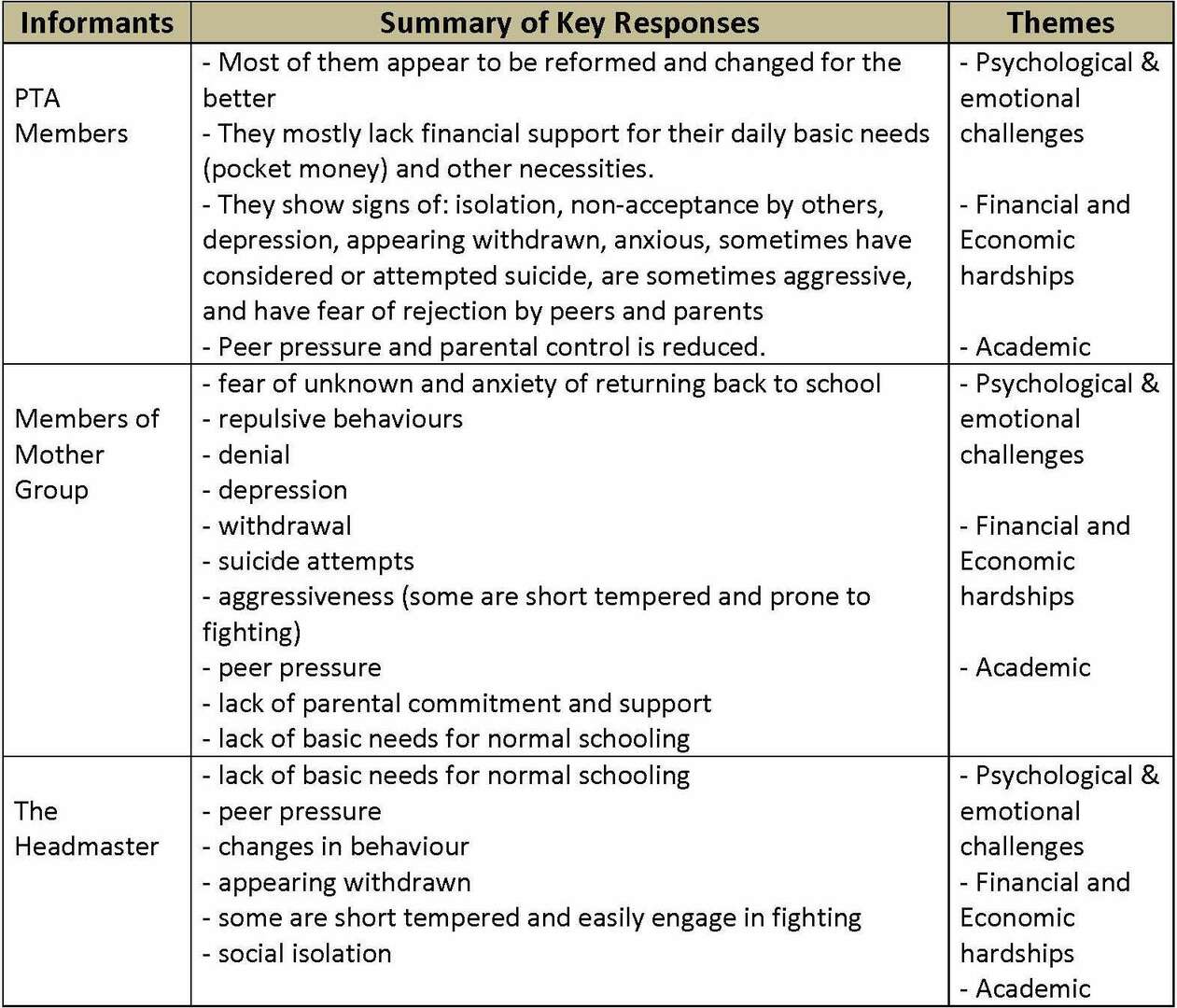
Specific Inquiry Question 2
The specific inquiry question responded to was: What are the psychosocial support approaches provided by Mother Group to Form 3 girl students (Brenda, Gertrude, Tamala and Sonia) who temporarily withdrew due to pregnancy and were later re-admitted? In response to this research question the respondents mentioned several psychosocial support approaches:
(1) One-on-one counselling sessions arranged for the length of each term
(2) Girls-retreat sessions: During these sessions, about two to three days are scheduled (usually during one of the weekends in a school) when girl students are brought together to allow extended time for the girls to explore personal issues more in-depth and intimately with counsellors of Mother Group.
(3) Online small group discussions for sharing personal experiences with the members of Mother Group.
(4) Inspirational Talks: Mother Group arranges for local citizens who have gone through a hard life and are successful in society to speak, be it successful business people, school graduates or retirees from various fields. During these sessions, several role models from other sectors of society such as health, agriculture and NGOs are invited to the event to share their life histories and personal experiences. These are deemed to offer further motivation for all girls. The success stories of these citizens serve as a great motivation for many students to harness resilience in relation to the challenges they face in school.
Specific Inquiry Question 3
The specific inquiry question responded to was: What is the impact of psychosocial intervention offered by Mothers Group to re-admitted girl students (Brenda, Gertrude, Tamala and Sonia) on the drop-out rate after re-admission? In response to this research question the respondents (The headmaster and members of PTA of the school) provided the information for Table 5 below.
Table 5
Trend In Dropout Rate of Adolescent Mothers

Specific Inquiry Question 4
The specific inquiry question responded to was: How does the psychosocial support by Mother Group to re-admitted girl students (Brenda, Gertrude, Tamala and Sonia) improve their mental health, well-being and hope for their education? In response to this research question the students provided the responses shown in Table 6 below.
Table 6
How Psychosocial Support Improves Mental Health, Well-Being And Hope For The Education Of Adolescent Mothers Who Have Been Re-admitted To School
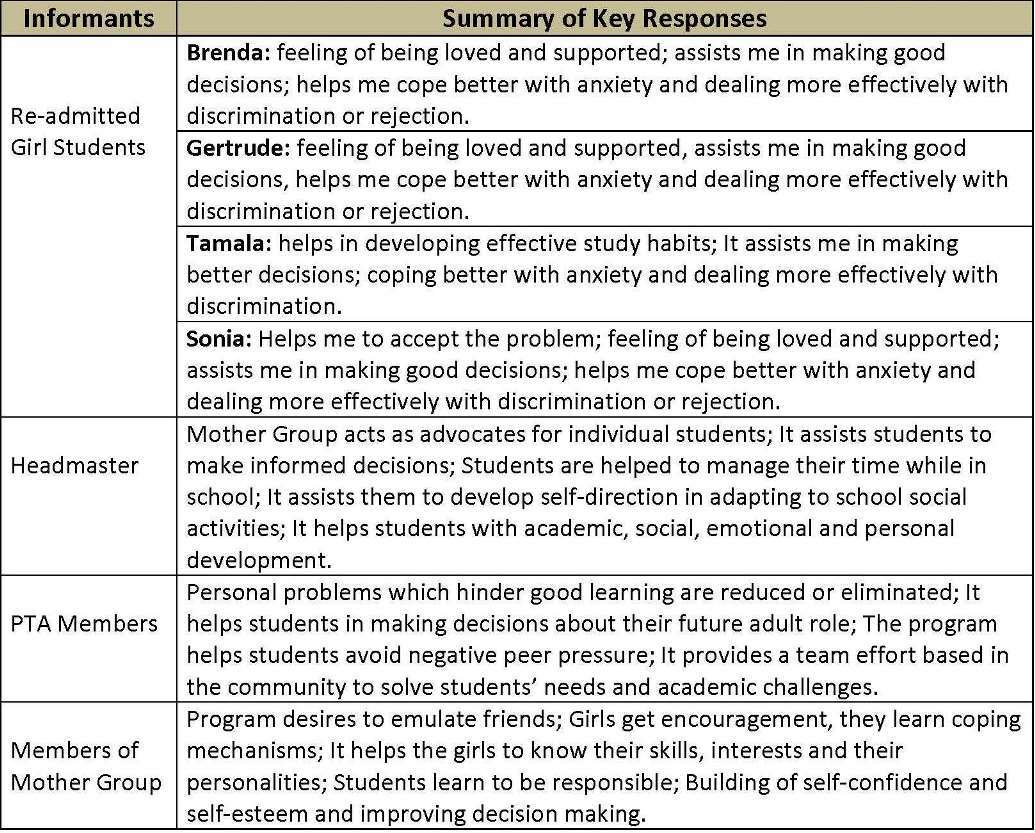
Challenges faced by adolescent girl students who temporarily withdrew due to pregnancy and are now re-admitted
Psychosocial well-being for adolescent mothers results from the provision of many supports to help young mothers face the challenges they face, including making healthy social connections and being reintegrated into school. In the current study, members of a support group in a Malawi school – Mother Group – emphasised that poor decision making, immaturity, and a desire to emulate friends are major factors that lead to adolescent pregnancy. Similarly, Kyei (2012) reported that for most teenagers, inability to make decisions on simple but important life decisions, inability to foresee the consequences of their behaviour and their psychological immaturity put them at risk of getting impregnated by their boyfriends.
The news of an adolescent daughter being pregnant is a shock and a disappointment to most parents or guardians. Many parents stop supporting their daughters when they hear the news (Kyei, 2012), although after recovering from the shock they most often slowly resume the provision of assistance. Also, the negative reactions of classmates and friends towards adolescent mothers have an adverse impact on their social life. As can be noted in the results above, the emotional distress adolescent mothers experience is often in the form of fear and anxiety related to both parental and peer responses to the pregnancy. When returning to school the fears and anxieties constantly affect student-mothers, making it very difficult for them to fully and effectively participate in their academic activities (Poudel, Upadhaya, Khatri, and Ghimire, 2018).
Psychosocial support approaches by Mother Group, their impact on dropping out of school and how the interventions improve the mental health, well-being and hope for the education of adolescent mothers
The regular retreats, guidance and counselling, inspirational talks and the one-to-one sessions being provided by Mother Group for adolescent student mothers reassures each one of them that they are not alone and that other students and community members have experienced similar challenges and struggles. It presents the opportunity to receive support from fellow students and to give the same to them as well. Both of these arrangements also lend themselves to academic support for effective learning. Receiving support from members of Mother Group and fellow students, and giving support back, is part of the relationship forming that occurs through Mother Group and enables continuous growth and learning among returning student-mothers.
Also, the group assists adolescent student mothers with developing communication and social skills and strengthening their abilities to accept criticism from others and express themselves regarding their issues. The support received by the student-mothers may be an important factor in decreasing the dropout rate as observed in the data for question 3 above. At the time of the inquiry none of the participating student-mothers had dropped out after returning to school.
Mother Group members also share their own life histories (inclusive of their own contraceptive and pregnancy experiences) with participating adolescent mothers. All the sharing adds up, as is evident in this statement by one of the participants:
“….when I was found with pregnancy Mother Group members started supporting me morally to give me strength and resilience as thoughts of suicide emerged in me. Soon after I gave birth, my parents were extremely furious and my mother cried. But my grandmother encouraged me to go back to school and to start using family planning to avoid another occurrence. Mother Group members managed to cool my parents down and their love and support started slowly….” – (Sonia, 7th January, 2022)
All the adolescent mothers interviewed explained that the news and knowledge of their pregnancies had a very disturbing impact not only on their normal psychological wellbeing, but also on their relationships with their parents and siblings. Tamala stated:
“…. I failed to hide my pregnancy. Being an adolescent, the fact of having a pregnancy was so much frustrating and not believable. Guilt, shame, emotional and mental distress took control of me and the thoughts of suicide started knocking’. But members of Mother Group helped me to recover from this thickness through their counselling….” (Tamala, 7th January, 2022)
In our society, negative perceptions of adolescent mothers appear to be a major underlying factor in the challenges adolescent mothers face (Roth, Ron and Benita, 2009). All the adolescent mothers interviewed in this study felt right from the initial pregnancy news that they were handled and treated as outcasts, as familiar strangers in their own homes and as perpetrators of shame on their parents. The larger community also considers them as bad examples for fellow and younger girls. This discrimination and stereotyping is overwhelmingly discouraging.
Conclusion
Through the psychosocial support provided by members of Mother Group, adolescent student mothers in this study were helped to strengthen their resilience, reflect on their mistakes, unlearn vices and learn new behaviours and morals that also contributed to fuller academic engagements. The program helps participants re-establish relationships, strengthen resilience and improve their ability to cope with difficult situations. They become better at identifying dangerous and risky situations and are better able to excel in life.
The psychosocial support for adolescent mothers provided by members of Mothers Group also seemed to reduce negative behaviour of adolescent student mothers and this seemed to reduce the chances that participating adolescent student mothers would become school dropouts. The program benefited the mental health of participants by lowering their stress, anxiety, depression, and enhancing their self-esteem.
The psychosocial support that girl students receive from members of Mother Group during the entirety of each academic term becomes the support on which they lean, build their lives around and use to contribute to their school’s routine activities. What Mother Group does is to contribute to building a lifestyle of empathy, interactivity and kindness which ensures that re-admitted girl students feel included, inspired and motivated to continue learning as before.
Psychosocial support for adolescent girls can contribute to opportunities beyond education. The girls in the present study developed and enhanced competencies such as resilience, self-awareness, collaboration, empathy, and respect; these qualities are important in many aspects of life.
References
Brannick, T. and Coghlan, D. (2007) In defense of being “native”: The case of insider academic research. Organizational Research Methods. Vol.10(1). Available at: https://doi.org/10.1177/1094428106289253 [Accessed: Sunday, 01 May 2022]
Chaima, S. (June 25, 2021) Malawi: Ntchisi Registers Over 396 Teenage Pregnancies in 6 Months. Nyasa Times Online Newspaper. Available at: https://allafrica.com/stories/202106250344.html [Accessed: Friday, 14 January, 2022]
Cochran-Smith, M. and Lytle, S. L. (2009) Inquiry as stance: Practitioner research for the next generation. Available at: https://books.google.com/books/about/Inquiry_as_Stance.html?id=CT0SBQAAQBAJ [Accessed: Sunday, 01 May 2022]
Costa, A. and Kallick, B. (1993) Through the Lens of a Critical Friend. Educational Leadership, 51(2) 49-51. Also available at: https://www.ascd.org/el/articles/through-the-lens-of-a-critical-friend
Dick, B. and Ferguson, B. J. (2015) Health for the world’s adolescents: a second chance in the second decade. Journal of Adolescent Health, 56, 3-6.
Dilshad, R. M. and Ijaz Latif, M. (2013) Focus group interview as a tool for qualitative research: an analysis. Pakistan Journal of Social Sciences, 33, 191-198.
Ellis, N. L. (2012) Teachers’ experiences as practitioner researchers in secondary schools: A comparative study of Singapore and NSW. Available at: http://prijipati.library.usyd.edu.au/handle/2123/8609 [Accessed: Monday, 02 May 2022]
Gyesaw, N.Y.K and Ankomah, A. (2013) Experiences of pregnancy and motherhood among teenage mothers in a suburb of Accra, Ghana: a qualitative study. International Journal of Women’s Health. Available at: http://dx.doi.org/10.2147/IJWH.S51528 [Accessed: Friday, 14 January, 2022]
Herranen, J., Kousa, P., Fooladi, E., Aksela, M. (2019) Inquiry as a context-based practice – a case study of pre-service teachers’ beliefs and implementation of inquiry in context-based science teaching. International Journal of Science Education. Available at: https://doi.org/10.1080/09500693.2019.1655679 [Accessed: Thursday, 10 February 2022.]
Krueger, R. A. (2014) Focus Groups: A Practical Guide for Applied Research. 5th Ed., United Kingdom: Sage.
Kyei, K.A. (2012) Teenage Fertility in Vhembe District in Limpopo Province, How High is that? Scholarlink Research Institute Journals. Available at: https://citeseerx.ist.psu.edu/viewdoc/download?doi=10.1.1.301.5438&rep=rep1&type=pdf [Accessed: Monday, 17 January, 2022]
Matebule, T. (August 1, 2020) Teen Pregnancies Surge in Malawi. Gender Links for equality and Justice. Available at: https://genderlinks.org.za/news/teen-pregnancies-surge-in-malawi/ [Accessed: Friday, 21 January, 2022]
Mercer, J. (2007) The challenges of insider research in educational institutions: wielding a double‐edged sword and resolving delicate dilemmas. Oxford Review of Education. Vol.33(1). Available at: https://DOI:10.1080/03054980601094651 [Accessed: Sunday, 01 May 2022]
Ministry of Education, Science & Technology (2018) Readmission Policy for Primary and Secondary Schools. Malawi Government. https://docplayer.net/218144716-Readmission-policy-for-primary-and-secondary-schools.html
National Statistical Office (2017) The 2015–2016 Demographic and Health Survey Full Report. Zomba: The DHS Program.
Nayeja, R. (20 August, 2020) Malawi: Machinga Registers Over 2000 Teen Pregnancies. Malawi News Agency. Available at: https://allafrica.com/stories/202008200900.html [Accessed: Friday, 21 January, 2022]
Poudel, S., Upadhaya, N., Khatri, R.B. and Ghimire, P.R. (2018) Trends and factors associated with pregnancies among adolescent women in Nepal: Pooled analysis of Nepal Demographic and Health Surveys (2006, 2011 and 2016). PLoS ONE 13: e0202107. Available at: 7. https://doi.org/10.1371/journal.pone.0202107 [Accessed: Friday, 28 January 2022]
Rennekamp, R.A. and Nall, M.A. (n.d.) Using Focus Groups in Program Development and Evaluation. University of Kentucky Cooperative Extension, Lexington. Available at: https://psd.ca.uky.edu/files/focus.pdf [Accessed: Friday, 14 January, 2022].
Roth, G., Ron, T. and Benita, M. (2009) Mothers’ parenting practices and adolescents’ learning from their mistakes in class: The mediating role of adolescent’s self-disclosure. Learning and Instruction. Available at: www.elsevier.com/locate/learninstruc [Accessed: Friday, 14 January, 2022]
Sedgh, G., Finer, L. B., Bankole, A. M., Eilers, A., & Singh, S. (2014) Adolescent pregnancy, birth and abortion rates across Countries: Levels and recent trends. Adolesc Health. Vol.56 (2).
To cite this work, please use the following reference:
Mgungwe, F. (2022, October 11). Malawi’s School-based Psychosocial Support: How Mother Group Supports Adolescent Mothers. Social Publishers Foundation. https://www.socialpublishersfoundation.org/knowledge_base/malawis-school-based-psychosocial-support-how-mother-group-supports-adolescent-mothers/
